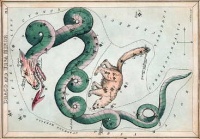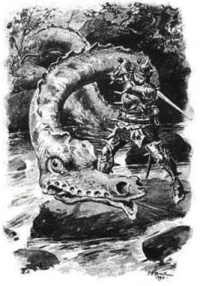Difference between revisions of "Chapter 60: 585-596"
Greenlantern (Talk | contribs) (→Page 591) |
Greenlantern (Talk | contribs) (→Page 589) |
||
| Line 30: | Line 30: | ||
==Page 589== | ==Page 589== | ||
'''the number nine'''<br> | '''the number nine'''<br> | ||
| − | Nine is strongly associated with the Chinese dragon, a symbol of magic and power. There are nine forms of the dragon, it is described in terms of nine attributes, and it has nine children It has 117 scales - 81 yang (masculine, or bad influence) and 36 yin (feminine, or good influence). All three numbers are multiples of 9 (9x13=117, 9x9=81, 9x4=36)[7] as well adding up individually to 9 (1+1+7=9, 8+1=9, 3+6=9). From/See more at [http://en.wikipedia.org/wiki/9_(number) WIKI] | + | Nine is strongly associated with the Chinese dragon, a symbol of magic and power. There are nine forms of the dragon, it is described in terms of nine attributes, and it has nine children It has 117 scales - 81 yang (masculine, or bad influence) and 36 yin (feminine, or good influence). All three numbers are multiples of 9 (9x13=117, 9x9=81, 9x4=36)[7] as well adding up individually to 9 (1+1+7=9, 8+1=9, 3+6=9). From/See more at [http://en.wikipedia.org/wiki/9_(number) WIKI] |
| + | |||
| + | '''inviolable'''<br> | ||
| + | In religion and ethics, inviolability or sanctity of life is a principle of implied protection regarding aspects of sentient life which are said to be holy, sanctified, or otherwise of such value that they are not to be violated. In western religions, the concept is based on the belief that all human beings have souls or are created in God's image. The concept of inviolability is an important tie between the ethics of religion and the ethics of law, as each seeks justification for its principles as based on both purity and natural concept, as well as in universality of application. From [http://en.wikipedia.org/wiki/Inviolable WIKI] | ||
==Page 591== | ==Page 591== | ||
Revision as of 12:38, 22 October 2009
Page 585
"Sandwich"
See pages 366 & 367.
Page 586
Quit-Rent
See page 359.
Page 587
Draco, the DragonLambton Worm
The Lambton Worm is a legend from the North East of England in the UK. The story is one of the area's most famous pieces of folklore, having been adapted from written and oral tradition into pantomime and song formats. From WIKI
Lambton Castle
Lambton Castle, located in County Durham, England, between the towns of Washington and Chester-le-Street, is a stately home, the ancestral seat of the Lambton family, the Earls of Durham. From WIKI
Cockfield
Cockfield is a village on the edge of Teesdale, County Durham, in England. It is situated a few miles to the south-west of Bishop Auckland. Remains found on Cockfield Fell suggest there was a settlement in the area in the Iron Age. The parish church, dedicated to St Mary the Virgin, probably dates from the late 12th century. Coal mining began in the area in the medieval period. From WIKI Also, see page 504.
Page 588
John LambtonThe story revolves around John Lambton, an heir of the Lambton Estate, County Durham, and his battle with a giant worm which had been terrorising the local villages. As with most myths, details of the story change with each telling. From WIKI
Lamprey
A lamprey (sometimes also called lamprey eel) is a parasitic marine animal with a toothed, funnel-like sucking mouth. Translated directly, their name means stone lickers (lambere = to lick, and petra = stone). While lampreys are well known for those species which bore into the flesh of other fish to suck their blood, these species make up the minority. In zoology, lampreys are often not considered to be true fish because of their vastly different morphology and physiology. From WIKI
Abdul
Abdul (Arabic: عبد ال ), (also transliterated Abdel, `Abd al- (Arabic: عبد ال ), and other ways) is a phrase composed of the word عبد (Abd: servant or slave) and ال (Al: , the prefix meaning "the"); it means "slave/servant of the". The phrase appears as a component of many Arabic and specifically Muslim names, where it is the opening of religiously based names meaning servant of God, where the last component of the name is a name for God, such as "The Creator" etc. The term is combined with one of the Names of God in the Qur'an to form a Muslim Arabic theophoric name. Common examples are Abdul Aziz (Servant of the Almighty), Abdul Rahman (Servant of the Benevolent), and Abdul Rahim (Servant of the Merciful). The name "Abdul Masīh" (عبد المسيح), meaning "servant of the Messiah" is an Arabic Christian equivalent. From WIKI
Page 589
the number nine
Nine is strongly associated with the Chinese dragon, a symbol of magic and power. There are nine forms of the dragon, it is described in terms of nine attributes, and it has nine children It has 117 scales - 81 yang (masculine, or bad influence) and 36 yin (feminine, or good influence). All three numbers are multiples of 9 (9x13=117, 9x9=81, 9x4=36)[7] as well adding up individually to 9 (1+1+7=9, 8+1=9, 3+6=9). From/See more at WIKI
inviolable
In religion and ethics, inviolability or sanctity of life is a principle of implied protection regarding aspects of sentient life which are said to be holy, sanctified, or otherwise of such value that they are not to be violated. In western religions, the concept is based on the belief that all human beings have souls or are created in God's image. The concept of inviolability is an important tie between the ethics of religion and the ethics of law, as each seeks justification for its principles as based on both purity and natural concept, as well as in universality of application. From WIKI
Page 591
if God should allow him victory over the Worm, he would sacrifice unto Him the first living thing he then happen'd to see
Biblical allusion. In Judges 11, Jephthah vowes to sacrifice whoever first comes into his house, should God grant him victory over the Ammonites. It is actually Jephthah's daughter, and the sacrifice is accomplished. Interpretations disagree though on whether "sacrifice" has to be taken literally.

